#so yeah no more twitter
Text
I actually logged myself out of my own twitter acc and haven’t used it for days I never knew life could be so beautiful not knowing everything that’s going on over there 24/7
#‘um nat didn’t you already quit like 2 times before’#well you see. no.#I just keep opening the browser version instead of the app once I deleted it#but it’s too much of a pain in the ass to log back in#so this time my quitting twitter has actually been successful#I can still log onto my laptop and use it there but it’s wayyy too much of a hassle to do that lol#I don’t really use my laptop much except for school work and gaming it’s too much effort to use it soley for scrolling#so yeah no more twitter#yipeeee#.___.
17 notes
·
View notes
Text
tbh I really like the idea of married Adrien and Marinette adopting their kids. Both because it's kind of a flex on Gabriel and Emilie (who thought that the appropriate response to difficulty conceiving was to hunt down ancient magical artifacts and then create a magical son that they could puppeteer and control...... because adoption/surrogates were apparently.... beneath them. or something.) but also because I just think it'd be really cute.
Like, imagine Ladybug and Chat Noir, heroes of Paris, adopting Parisian orphans. imagine Marinette and Adrien struggling to get on the good side of a "difficult" traumatized child who used to spend their days in the foster system fantasizing about Ladybug and Chat Noir saving them without realizing the new parents trying to connect with them rn ARE Ladybug and Chat Noir. Imagine them fostering kids themselves and just being A+ stellar parents between Adrien's patience and Marinette's attentiveness and both of their affection. idk I just think there's a lot there and it could be sosososo sweet
#also ok. TO BE CLEAR: astruc has implied on twitter that sentimonsters are capable of reproducing. so this isnt like CANON or anything. BUT#........ what if they couldn't teeeheee!!!!! just for meeeee!!! for my little adoption aus!!!!!!!!!!! xoxoxo#(not that you can't adopt while also being able to conceive but yknow makes it more likely or whatever)#but yeah ive always been a big huge sucker for adoption and adoption stories and i want to gobble them up. thanks for coming to my tedtalk
5K notes
·
View notes
Text



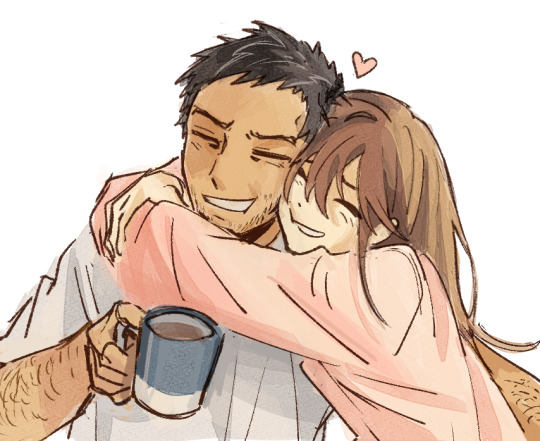
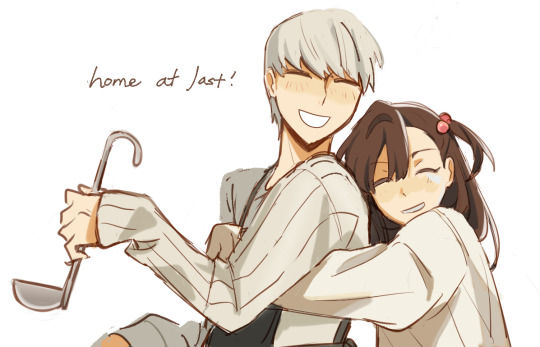
10 years in the future for Nanako-chan
#nanako dojima#persona 4#yu narukami#ryotaro dojima#tohru adachi#a little sister... a LITTLw sister. you expect me to not fawn...? to not crumble? ok....#go on. look....... go on. GO ON!!!!! (crazed) (eye twitching) (i like these 4 and nana-chan especially)#hope you like my older design for her...#funfacts i said on twitter so i'll put on tags here:#adachi did his time in jail quick. yu's 27 and still looks the same. pretty bancho#i think nanakos signature color would change from pink to yellow. yu doesn't actually wear any yellow at all in p4g IIRC#but it is a color you associate him with the most. i want nanako to adopt that color. BUUUTTT#for self indulgent's sake she does wear pink to get yu to dote on her more. (reminds him fondly of baby nana-chan)#(AGHHHHHHHHHHHHHHHHHHHHHHH!)#oh yeah and adachi's a hag. i think his fashion is handpicked by yu probaably.#(thinking if i missed anything else) ahhhh........... nanako-chan... return for p6 or something. ok byeee!
2K notes
·
View notes
Text

#monkey d. luffy#gear 5#gear 5 luffy#one piece#my art#messy and i have no clue about anatomy#very inspired by 2964_KO on twitter#check them out if you dont know them.. i cant remember the last time i was more blown away and inspired by art honestly. lol...#theyre the same age as me too sigh#but now i feel more motivated to level up and push myself to try new things so yeah. life is ok for now#my friend calls g5 luffy 'cloud luffy' :)
2K notes
·
View notes
Text
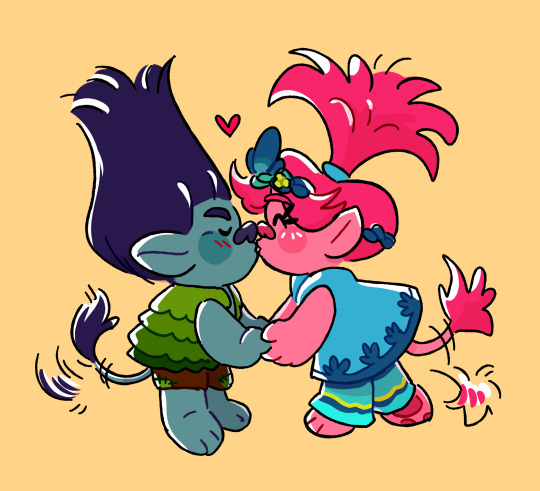
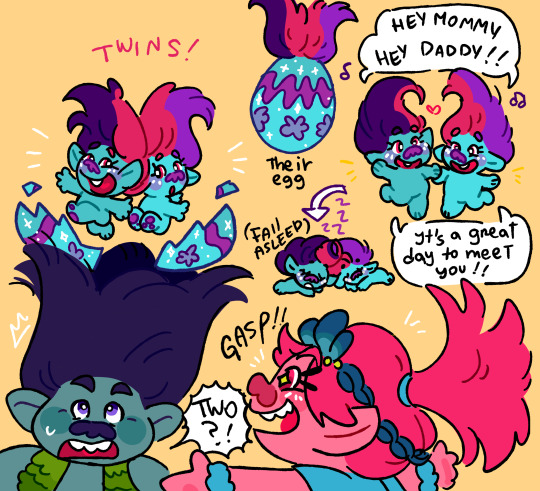
I LOVE BROPPY
*gives them babies*
#trolls dreamworks#trolls#my art#queen poppy#branch trolls#poppy trolls#broppy#branch x poppy#i love them dearly#my beloveds#fankid#in twitter there are SO many broppy babies and they're all beautiful :''''v#the troll babies have no names yet asjdaksjd#i'll draw a little comic about them deciding their names bc it'd be cute methinks#also yeah more twins bc since I have twin baby brothers my first thought for fankids is almost always twins SJDKSJ#that singing mommy and daddy and then just falling asleep is from when jake the dog was born alskdalsd#their hair is supposed to look a tad bit like floyd's akjsdja#NOO I FORGOT THE BABIES' TAILS :'''V
1K notes
·
View notes
Text
I'm thinking abt that pretty fall leaves embroidery pattern post and about how like... it is categorically a repost, it's a reupload. right? a thing that is generally disliked. but because it's credited, it's genuinely boosting the artist in question.
and it could ALWAYS be like this. reposting content could ALWAYS be a symbiotic relationship, but because sourcing back to the original creator of something is so uncommon, it's just easier to ask people not to repost it at all. and people still don't understand the difference. or they'll go to the effort of cropping out usernames/signatures to repost something, which is More Effort than literally crediting the creator of something you liked enough to want to repost.
Like. I literally don't actually care if my own shit gets reposted, you have to understand. I just don't want it STOLEN. But "do not repost" is easier to write on my art than "you can repost this, but don't alter the image/remove my signature, don't you dare write 'credit goes to the artist' because that is not credit, please link back to my original post or someplace that you can actually find me. please use an actual link/url instead of writing a non-clickable link of my username, because making it text instead of a clickable link cuts the number of people who will go to the effort of visiting my own page in Half."
All those aggregate themed accounts, those fuckin annoying as hell instagrams and facebook groups that are like "body positive art we love wamen 💕 hashtag feminism" and then MASS-STEAL plus sized art created by women, if pages like these that always go and steal my older self-portraits and other works... If they just put a link to my prints of those pieces in the text of those posts, or, fuck, my commission info page? I would literally be living on the moon right now. I would have a house on the moon
#there is actually nothing morally wrong with running an account that just reuploads ppl's artwork or their jokes or their cosplays#if you just put a VISIBLE LINK in the description of your post with proper credit then it would be beneficial for everyone#because you can get your little clout or whatever it is you want by putting a bunch of same-category content on a page#but nobody's getting fucked over because if your post blows up then people just get FUNNELED to the source#because it's placed so plainly where everyone can see it#and yeah it's better to retweet or reblog but#on the rare occasion that I see my shit reuploaded on tumblr WHICH IS WEIRD BC I MAKE MY OWN POSTS HERE but anyway#someone making their own post where they upload my stuff. and it's always the floral self portraits so let's say it's a post with all those#if I scroll to the bottom and it says like. Artwork by Serglesinner on Twitter <-- clickable link [Sergle's Prints] <-- clickable link#to my etsy#I'm like oh okay and all the anger leaves my body and I'm like ah I see. and I toss the rock aside#like oh okay so you actually care that a person made these pieces. Instead of posting the caption ''women <3'' or smth#like you've GOTTA die if you do that. but if you just link back#or if you go to the effort of writing like a description with a BLURB? like it's a damn museum. like a light paragraph of info#about what the art is and who made it and their links#I am literally sucking you in a strange and peculiar manner. that is extremely helpful#and maybe other artists don't want this AT ALL and they'd rather people not reupload even if it is credited#but I feeeeeeeeel. like 99% of the time this would solve the issue#reposters could genuinely be helping ppl. sometimes the repost gets more traction than the real thing#as long as it credits the creator then that's an okay thing to happen!#that can land somebody a sale! a commission order! a new fan! A JOB#A JOB!!!!!!!!!!#sergle.txt#I didn't write this eloquently AT ALL what the fuck ever barkbarkbarkbark
792 notes
·
View notes
Text
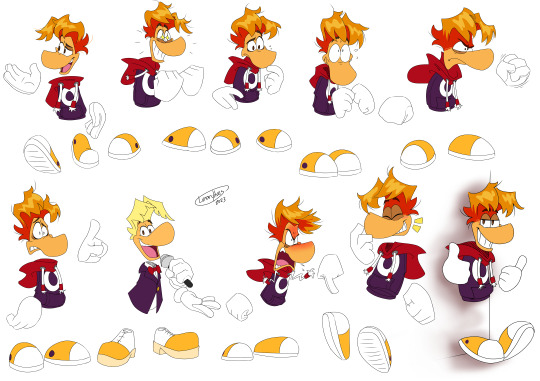
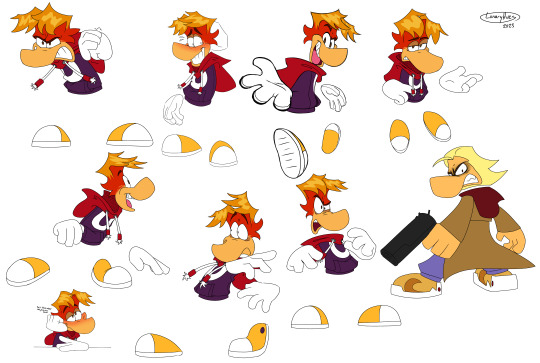
Me: "Can I please use all this energy to draw on an actual project"
My brain: "You will draw the same character over and over and you will like it."
Me: "Okay."
#rayman#artists on tumblr#these were made over the course of like two months or so#you can see that i was messing with his design a bit#kind of adjusting the way i drew him as i went along#uhhh anyways yeah i just think he's neat#he's fun to draw#its because he doesn't have limbs#drawing limbs is my least favorite part of drawing any humanoid character#so him not having any takes away a lot of the frustration i often have in drawing certain dynamic poses#he's also very cartoony which is up my alley. very expressive and fun#he has helped me push drawing exaggerated expressions more#he has good shapes!! its good character design!!!#and drawing him is comforting#i'll draw something else eventually but for now i'm just having fun#i have no idea how i'm going to format this post on twitter without it getting cropped to hell#i will worry about that later
434 notes
·
View notes
Text


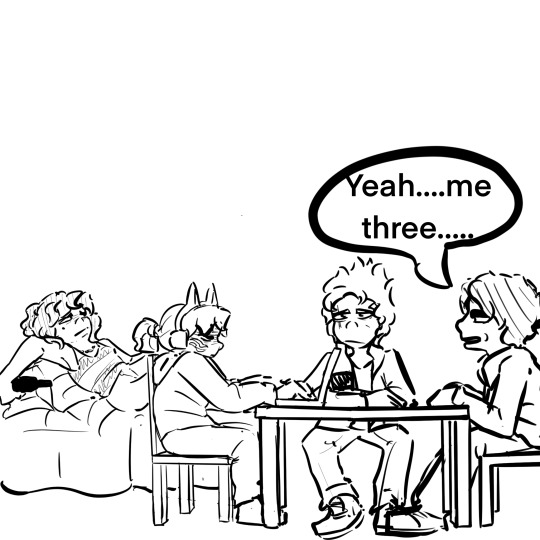

LMAO Just smth funny that came to my mind the other day ab Cole Kai Nya and Zane moping around ab missing their “wives”. It started off with Sora and Nya only but I just kept remembering everyone else who is basically separated from their couple in the show lol.
I ranted sm on the tags i ran out for space to tag everyone bye
#and if u dont get it:#Nya is talking ab jay#Kai ab Skylor#Zane ab pixel#and Cole ab geo#WHO HE FUCKING LEFT HELLOOOOO BRO YOU. SAID YOU WOULDNT LEAVE HIM#WHAT AB YOUR. KIDS COLE.#WHAT AB#fuck i forgot her name#the skeleton girl for no way i forgot#BONZLE#THERE YOU GO#WHAT ABOUT BOOONZLE#I’m well see them next season tho. like i just know it.#especially cuz we got comfrimation in twitter that we would be discovering more ab bonzle in the future?#so yeah well get to know more ab her#anyways#ninjago#ninjago dragons rising#ninjago dr#dragons rising#ninjago fanart#lego ninjago#lego#dragons rising fanart#ninjago sora#sora ninjago#sora#cole brookestone#ninjago cole
195 notes
·
View notes
Text

that one very relevant-to-my-interests meme
#giant/tiny#size difference#g/t#sfw g/t#sfw gt#sfw furry#I guess#stoat scribbles#Bagel Bite#I don't usually ask this but any and all reblogs are very welcome :')#I posted this on twitter and it's being actively flagged as 'sensitive content' like ALL my other art lately#Any sharing is greatly appreciated#it's the only way to expand my audience/clientele#also the only way to let more people see cute stuff like this#so#yeah
654 notes
·
View notes
Text

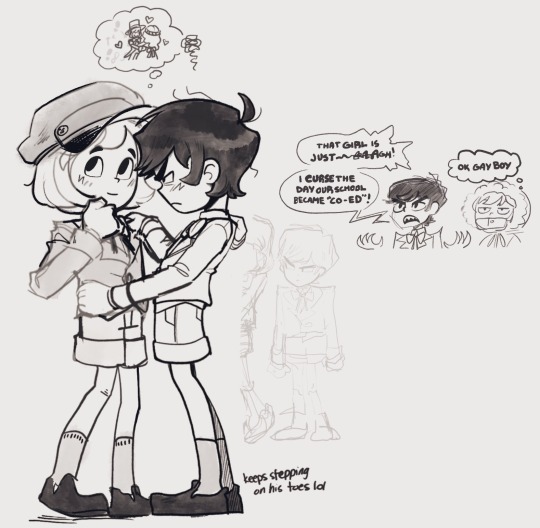

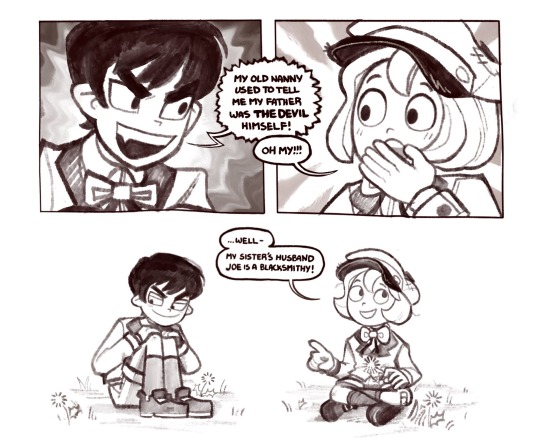
great expectations + the omen again!! but with drama!!?
great omens.... (not to be confused with good omens of course. srry neil gaiman 😅 lol)
#pip pirrup#damien thorn#estella havisham#sp dip#rebstella if u squint#drew these weeks ago but only posted on twitter EEP hi#great omens#i wanna draw more so ya. makes that a tag#my art#i secretly love love triangles in media but only when they are silly enough#kenny#oh yeah hes there too. still south park fanart guys haha 😂
1K notes
·
View notes
Text

this drawing took shrimply everything from my soul and turned it into soup to bare at the turn of the century Haii kay bye
#ace attorney#mo art#tgaa#ryunosuke naruhodo#the great ace attorney#ace attorney fanart#my art#kazuma asogi#tgaa 2 spoilers#tgaa spoilers#asoryuu#asoryuri#YEAH THEY ARE BUTCHES COME @ ME BRO#haha ont though i am so small and tiny#anyway#lol um#hey how are you doing#this drawing took like 3 days#and i only finished it bc i hit 100 followers on twitter so#any twitter ppl haiii#go follow me there i post more sketches#i love the tagging here though#so i shall always come back to my roots#love you all#if you want the speed draw just put it in the comments and ill put it in here#love and peace#on planet earth#yayy
106 notes
·
View notes
Text
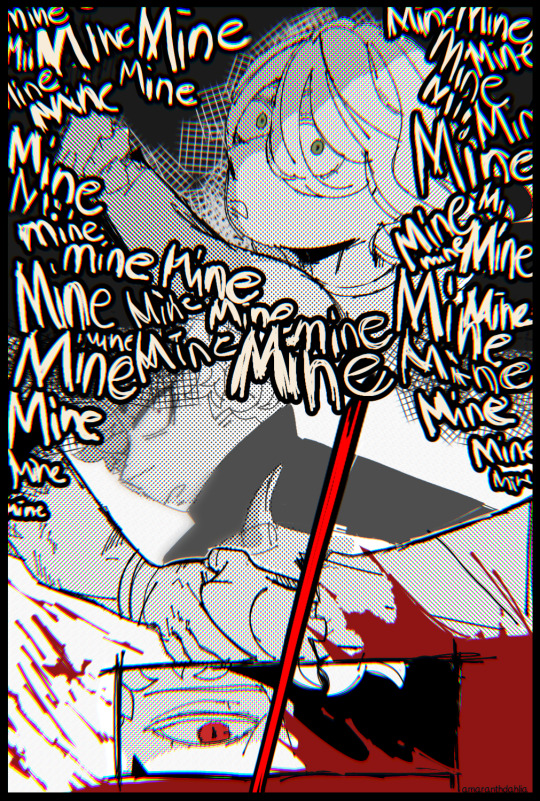
if you won't be mine ... then
#ik i havent made it obvious here on tumblr but i was absolutely obsessed with this chapter holy fuck#hori COOKED with this chapter my GOD#ive been asking for ofa/afo lore for a year and we finally got it !!!!!#and fuckkkk i ate it all up and ate the plate too#im more active on twitter so u couldnt tell but yeah i fucking love the ofa lore/subplot#and i absolutely LOVE yoichi and kudou#so this chapter sent me to heaven esp the last panels#also this made me wanna kill afo with hammers even more fucking creep#and it was so well written about it too#my god the way talked about yoichi made my skin crawl#and also his philosophy was frankly interesting#still think he should drop dead by the end tho#anyways excited for more ofa lore my GOD ive waired for this shit for a year#my hero academia#boku no hero academia#mha kudou#shigaraki yoichi#shigaraki afo#all for one#2nd ofa user#mha manga spoilers#mha manga#mha 407#cw blood#dahlia.art
232 notes
·
View notes
Text
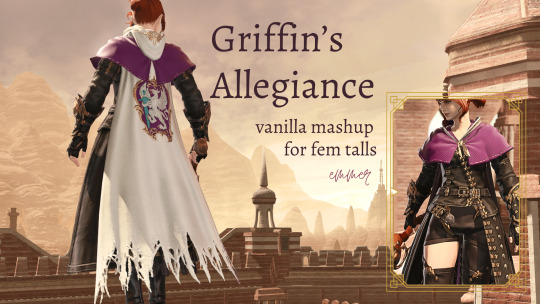

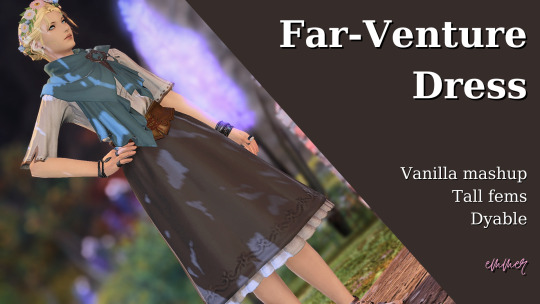


...and speaking of kofi, here's another lazy roundup post LOL
I worked really hard on the eveningwear specifically (and @dawnslight-aegis worked really hard on the upscales) so I hope some of y'all enjoy prancing around in silk robes.
#emmermods#emmer screens#vanilla msahups#ffxiv mods#gear mods#and yeah if you're not on twitter#the last two were winners of a poll haha#i made the bodice and then had 4873 capes i wanted to add#so the crowd helped me decide#i still might do more tbh
123 notes
·
View notes
Text

I did a thing…again.
Just realized that ya’ll need to click for better quality for some reason this post looks especially bad 🤚
#OKAY so this piece is a little old#I think I posted it on my twitter (of which I do not use anymore) and nobody really cared for it#WHICH IS FINE#I don’t make art for others I do it for me#BUT I know for a fact that some of you will definelty like this so I’m posting it on here as well#I added a WHOLE new just standing still sketch of Killer and a bunch of doodles to make it more fun#but technically the orginal piece was just the ‘in murder mode leaning over one’#which I could post seperately if ya’ll wanna see that idk??#ya know without the extra image of him and the doodles so its looks less like a collage#ANYWAYS back to the art I REALLY like how I drew Killer in this#LIKE HE LOOKS SO GOOD#ITS CRAZY#so pretty so lucious so cute#I’m literally obessed with drawing flame lighting#everything looks pretty in a nice warm glow#so yeah#he be standing#he be killing#hes killer#OH and all the doodles are of course easily apparent the rest are his trivia#oda thinks his flower is a snow drop#that boy would be a chef in a real world au#and one of his hobbies is playing the drums#so if ya’ll didn’t know that now you do#i also like to think how I wrote his name is how he signs his name#killer one piece#kid pirates#illustration#digital art#one piece
54 notes
·
View notes
Text
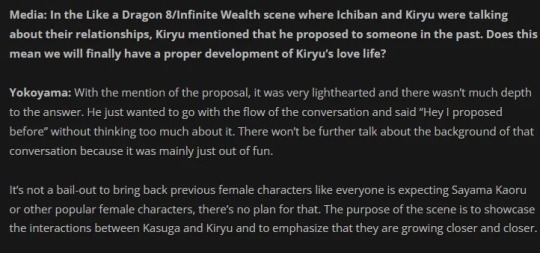
ladies and gentlemen. we got em
#this is so fucking FUNNY dude banxbsnanxb#STRAIGHT PEOPLE ON REDDIT ARE SO MAD AND IM JUST SITTING HERE. GRINNING. PLEASED#that’s 700x more in character than the alternative and I’m just praying this is true/legit (cause I couldn’t find the exact interview this#is from- but I didn’t see anyone saying it was fake on Twitter/Reddit so idk)#to be fair I could only scroll through comments on reddit for like a minute before it started giving me brain damage so#but yeah bdbxsbscshxjdj YOKOYAMA. MAYBE IVE BEEN GIVING YOU TOO LITTLE CREDIT.#I absolutely love seeing all these basic ass straight folks getting so pissy about him not settling down with a nuclear biological family#and a wife and all that and dying at the ripe old age of his fucking mid-50s#like no shit???? what games have you been playing bro the whole fucking Point of his idea of family is unconventional#he’s literally a fucking orphan who didn’t grow up with any biological family are you fucking fr#dgagdhdhd ANYWAY yeah I’m seriously hoping to high heaven that this is legit#rambling#kiryu#yakuza#rgg#rgg8
315 notes
·
View notes
Note
Hey! It has been on my mind lately and i just wanna ask..idk if it would make sense but i just noticed that nowadays ppl cant separate the authors and their books (ex. when author wrote a story about cheating and ppl starts bashing the author for romanticizing cheating and even to a point of cancelling the author for not setting a good/healthy example of a relationship) any thoughts about it?
I have many, many thoughts on this, so this may get a little unwieldy but I'll try to corall it together as best I can.
But honestly, I think sometimes being unable to separate the author from the work (which is interesting to me to see because some people are definitely not "separating" anything even though they think they are; they just erase the author entirely as an active agent, isolate the work, and call it "objectivity") has a lot to do with some people being unable to separate the things they read from themselves.
I'm absolutely not saying it's right, but it's an impulse I do understand. If you read a book and love it, if it transforms your life, or defines a particular period of your life, and then you find out that the author has said or done something awful--where does that leave you? Someone awful made something beautiful, something you loved: and now that this point of communion exists between you and someone whose views you'd never agree with, what does that mean for who you are? That this came from the mind of a person capable of something awful and spoke to your mind--does that mean you're like them? Could be like them?
Those are very uncomfortable questions and I think if you have a tendency to look at art or literature this way, you will inevitable fall into the mindset where only "Good" stories can be accepted because there's no distinction between where the story ends and you begin. As I said, I can see where it comes from but I also find it profoundly troubling because i think one of the worst things you can do to literature is approach it with the expectation of moral validation--this idea that everything you consume, everything you like and engage with is some fundamental insight into your very character as opposed to just a means of looking at or questioning something for its own sake is not just narrow-minded but dangerous.
Art isn't obliged to be anything--not moral, not even beautiful. And while I expend very little (and I mean very little) energy engaging with or even looking at internet / twitter discourse for obvious reasons, I do find it interesting that people (online anyway) will make the entire axis of their critique on something hinge on the fact that its bad representation or justifying / romanticizing something less than ideal, proceeding to treat art as some sort of conduit for moral guidance when it absolutely isn't. And they will also hold that this critique comes from a necessarily good and just place (positive representation, and I don't know, maybe in their minds it does) while at the same time setting themselves apart from radical conservatives who do the exact same thing, only they're doing it from the other side.
To make it abundantly clear, I'm absolutely not saying you should tolerate bigots decrying that books about the Holocaust, race, homophobia, or lgbt experiences should be banned--what I am saying, is that people who protest that a book like Maus or Persepolis is going to "corrupt children", and people who think a book exploring the emotional landscape of a deeply flawed character, who just happens to be from a traditionally marginalised group or is written by someone who is, is bad representation and therefore damaging to that community as a whole are arguments that stem from the exact same place: it's a fundamental inability, or outright refusal, to accept the interiority and alterity of other people, and the inherent validity of the experiences that follow. It's the same maniacal, consumptive, belief that there can be one view and one view only: the correct view, which is your view--your thoughts, your feelings.
There is also dangerous element of control in this. Someone with racist views does not want their child to hear anti-racist views because as far as they are concerned, this child is not a being with agency, but a direct extension of them and their legacy. That this child may disagree is a profound rupture and a threat to the cohesion of this person's entire worldview. Nothing exists in and of and for itself here: rather the multiplicity of the world and people's experiences within it are reduced to shadowy agents that are either for us or against us. It's not about protecting children's "innocence" ("think of the children", in these contexts, often just means "think of the status quo"), as much as it is about protecting yourself and the threat to your perceived place in the world.
And in all honestt I think the same holds true for the other side--if you cannot trust yourself to engage with works of art that come from a different standpoint to yours, or whose subject matter you dislike, without believing the mere fact of these works' existence will threaten something within you or society in general (which is hysterical because believe me, society is NOT that flimsy), then that is not an issue with the work itself--it's a personal issue and you need to ask yourself if it would actually be so unthinkable if your belief about something isn't as solid as you think it is, and, crucially, why you have such little faith in your own critical capacity that the only response these works ilicit from you is that no one should be able to engage with them. That's not awareness to me--it's veering very close to sticking your head in the sand, while insisting you actually aren't.
Arbitrarily adding a moral element to something that does not exist as an agent of moral rectitude but rather as an exploration of deeply human impulses, and doing so simply to justify your stance or your discomfort is not only a profoundly inadequate, but also a deeply insidious, way of papering over your insecurities and your own ignorance (i mean this in the literal sense of the word), of creating a false and dishonest certainty where certainty does not exist and then presenting this as a fact that cannot and should not be challenged and those who do are somehow perverse or should have their characters called into question for it. It's reductive and infantilising in so many ways and it also actively absolves you of any responsibility as a reader--it absolves you of taking responsibility for your own interpretation of the work in question, it absolves you of responsibility for your own feelings (and, potentially, your own biases or preconceptions), it absolves you of actual, proper, thought and engagement by laying the blame entirely on a rogue piece of literature (as if prose is something sentient) instead of acknowledging that any instance of reading is a two-way street: instead of asking why do I feel this way? what has this text rubbed up against? the assumption is that the book has imposed these feelings on you, rather than potentially illuminated what was already there.
Which brings me to something else which is that it is also, and I think this is equally dangerous, lending books and stories a mythical, almost supernatural, power that they absolutely do not have. Is story-telling one of the most human, most enduring, most important and life-altering traditions we have? Yes. But a story is also just a story. And to convince yourself that books have a dangerous transformative power above and beyond what they are actually capable of is, again, to completely erase people's agency as readers, writers' agency as writers and makers (the same as any other craft), and subsequently your own. And erasing agency is the very point of censors banning books en masse. It's not an act of stupidity or blind ignorance, but a conscious awareness of the fact that people will disagree with you, and for whatever reason you've decided that you are not going to let them.
Writers and poets are not separate entities to the rest of us: they aren't shamans or prophets, gifted and chosen beings who have some inner, profound, knowledge the rest of us aren't privy to (and should therefore know better or be better in some regard) because moral absolutism just does not exist. Every writer, no matter how affecting their work may be, is still Just Some Guy Who Made a Thing. Writing can be an incredibly intimate act, but it can also just be writing, in the same way that plumbing is plumbing and weeding is just weeding and not necessarily some transcendant cosmic endeavour in and of itself. Authors are no different, when you get down to it, from bakers or electricians; Nobel laureates are just as capable of coming out with distasteful comments about women as your annoying cousin is and the fact that they wrote a genre-defying work does not change that, or vice-versa. We imbue books with so much power and as conduits of the very best and most human traits we can imagine and hope for, but they aren't representations of the best of humanity--they're simply expressions of humanity, which includes the things we don't like.
There are some authors I love who have said and done things I completely disagree with or whose views I find abhorrent--but I'm not expecting that, just because they created something that changed my world, they are above and beyond the ordinarly, the petty, the spiteful, or cruel. That's not condoning what they have said and done in the least: but I trust myself to be able to read these works with awareness and attention, to pick out and examine and attempt to understand the things that I find questionable, to hold on to what has moved me, and to disregard what I just don't vibe with or disagree with. There are writers I've chosen not to engage with, for my own personal reasons: but I'm not going to enforce this onto someone else because I can see what others would love in them, even if what I love is not strong enough to make up for what I can't. Terrance Hayes put perfectly in my view, when he talks about this and being capable of "love without forgiveness". Writing is a profoundly human heritage and those who engage with it aren't separate from that heritage as human because they live in, and are made by, the exact same world as anyone else.
The measure of good writing for me has hardly anything to do with whatever "virtue" it's perceived to have and everything to do with sincerity. As far as I'm concerned, "positive representation" is not about 100% likeable characters who never do anything problematic or who are easily understood. Positive representation is about being afforded the full scope of human feelings, the good, the bad, and the ugly, and not having your humanity, your dignity, your right to exist in the world questioned because all of these can only be seen through the filter of race, or gender, religion, or ethicity and interpreted according to our (profoundly warped) perceptions of those categories and what they should or shouldn't represent. True recognition of someone's humanity does not lie in finding only what is held in common between you (and is therefore "acceptable", with whatever you put into that category), but in accepting everything that is radically different about them and not letting this colour the consideration you give.
Also, and it may sound harsh, but I think people forget that fictional characters are fictional. If I find a particularly fucked up relationship dynamic compelling (as I often do), or if I decide to write and explore that dynamic, that's not me saying two people who threaten to kill each other and constantly hurt each other is my ideal of romance and that this is exactly how I want to be treated: it's me trying to find out what is really happening below the surface when two people behave like this. It's me exploring something that would be traumatizing and deeply damaging in real life, in a safe and fictional setting so I can gain some kind of understanding about our darker and more destructive impulses without being literally destroyed by them, as would happen if all of this were real. But it isn't real. And this isn't a radical or complex thing to comprehend, but it becomes incomprehensible if your sole understanding of literature is that it exists to validate you or entertain you or cater to you, and if all of your interpretations of other people's intentions are laced with a persistent sense of bad faith. Just because you have not forged any identity outside of this fictional narrative doesn't mean it's the same for others.
Ursula K. le Guin made an extremely salient point about children and stories in that children know the stories you tell them--dragons, witches, ghouls, whatever--are not real, but they are true. And that sums it all up. There's a reason children learning to lie is an incredibly important developmental milestone, because it shows that they have achieved an incredibly complex, but vitally important, ability to hold two contradictory statements in their minds and still know which is true and which isn't. If you cannot delve into a work, on the terms it sets, as a fictional piece of literature, recognize its good points and note its bad points, assess what can have a real world impact or reflects a real world impact and what is just creative license, how do you possible expect to recognize when authority and propaganda lies to you? Because one thing propaganda has always utilised is a simplistic, black and white depiction of The Good (Us) and The Bad (Them). This moralistic stance regarding fiction does not make you more progressive or considerate; it simply makes it easier to manipulate your ideas and your feelings about those ideas because your assessments are entirely emotional and surface level and are fuelled by a refusal to engage with something beyond the knee-jerk reaction it causes you to have.
Books are profoundly, and I do mean profoundly, important to me-- and so much of who I am and the way I see things is probably down to the fact that stories have preoccupied me wherever I go. But I also don't see them as vital building blocks for some core facet or a pronouncement of Who I Am. They're not badges of honour or a cover letter I put out into the world for other people to judge and assess me by, and approve of me (and by extension, the things I say or feel). They're vehicles through which I explore and experience whatever it is that I'm most caught by: not a prophylactic, not a mode of virtue signalling, and certainly not a means of signalling a moral stance.
I think at the end of the day so much of this tendency to view books as an extension of yourself (and therefore of an author) is down to the whole notion of "art as a mirror", and I always come back to Fran Lebowitz saying that it "isn't a mirror, it's a door". And while I do think it's important to have that mirror (especially if you're part of a community that never sees itself represented, or represented poorly and offensively) I think some people have moved into the mindset of thinking that, in order for art to be good, it needs to be a mirror, it needs to cater to them and their experiences precisely--either that or that it can only exist as a mirror full stop, a reflection of and for the reader and the writer (which is just incredibly reductive and dismissive of both)--and if art can only exist as a mirror then anything negative that is reflected back at you must be a condemnation, not a call for exploration or an attempt at understanding.
As I said, a mirror is important but to insist on it above all else isn't always a positive thing: there are books I related to deeply because they allowed me to feel so seen (some by authors who looked nothing like me), but I have no interest in surrounding myself with those books all the time either--I know what goes on in my head which is precisely why I don't always want to live there. Being validated by a character who's "just like me" is amazing but I also want--I also need-- to know that lives and minds and events exist outside of the echo-chamber of my own mind. The mirror is comforting, yes, but if you spend too long with it, it also becomes isolating: you need doors because they lead you to ideas and views and characters you could never come up with on your own. A world made up of various Mes reflected back to me is not a world I want to be immersed in because it's a world with very little texture or discovery or room for growth and change. Your sense of self and your sense of other people cannot grow here; it just becomes mangled.
Art has always been about dialogue, always about a me and a you, a speaker and a listener, even when it is happening in the most internal of spaces: to insist that art only ever tells you what you want to hear, that it should only reflect what you know and accept is to undermine the very core of what it seeks to do in the first place, which is establish connection. Art is a lifeline, I'm not saying it isn't. But it's also not an instruction manual for how to behave in the world--it's an exploration of what being in the world looks like at all, and this is different for everyone. And you are treading into some very, very dangerous waters the moment you insist it must be otherwise.
Whatever it means to be in the world, it is anything but straightforward. In this world people cheat, people kill, they manipulate, they lie, they torture and steal--why? Sometimes we know why, but more often we don't--but we take all these questions and write (or read) our way through them hoping that, if we don't find an answer, we can at least find our way to a place where not knowing isn't as unbearable anymore (and sometimes it's not even about that; it's just about telling a story and wanting to make people laugh). It's an endless heritage of seeking with countless variations on the same statements which say over and over again I don't know what to make of this story, even as I tell it to you. So why am I telling it? Do I want to change it? Can I change it? Yes. No. Maybe. I have no certainty in any of this except that I can say it. All I can do is say it.
Writing, and art in general, are one of the very, very, few ways we can try and make sense of the apparently arbitrary chaos and absurdity of our lives--it's one of the only ways left to us by which we can impose some sense of structure or meaning, even if those things exists in the midst of forces that will constantly overwhelm those structures, and us. I write a poem to try and make sense of something (grief, love, a question about octopuses) or to just set down that I've experienced something (grief, love, an answer about octpuses). You write a poem to make sense of, resolve, register, or celebrate something else. They don't have to align. They don't have to agree. We don't even need to like each other much. But in both of these instances something is being said, some fragment of the world as its been perceived or experienced is being shared. They're separate truths that can exist at the same time. Acknowledging this is the only means we have of momentarily bridging the gaps that will always exist between ourselves and others, and it requires a profound amount of grace, consideration and forbearance. Otherwise, why are we bothering at all?
#this is so much longer than i intended but yeah. those are my very long 2 cents#tbh i also think social media makes it worse in a way especially bc “transparency” has become a form of public vetting which is insane to m#me* transparency and honesty are not the same thing ans its ludicrous that this is where we're at and while we all have to live with this#demand for transparency i do think it affects writers differently bc the whole art as mirror thing comes to the fore in this argument#why would you sit with your feelings about a book when its easier and more accessible for you to @ the authors twitter handle#but anyway#ask#anonymous#book talks
399 notes
·
View notes